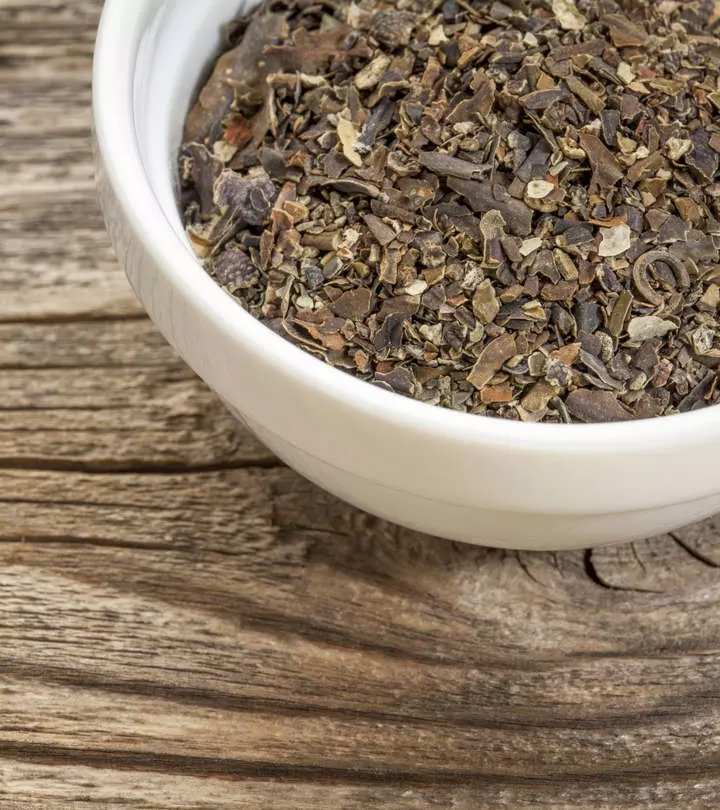Greek Yogurt Benefits: 11 Proven Ways To Boost Your Health
Improve your overall health and build a strong physique by adding this yogurt to your diet.

Image: Shutterstock
Greek yogurt benefits you in many ways compared to regular yogurt. It has more protein, is sour than normal yogurt, and has a much lower sodium content. In addition, most of the whey has been removed from this thick yogurt. Many of its benefits have made it a popular choice for fitness enthusiasts.

 Know Your Ingredient: Greek Yogurt
Know Your Ingredient: Greek YogurtWhat Is It?
A type of yogurt made by eliminating whey and other liquids from regular yogurt.
What Are Its Benefits?
It may aid in proper digestion, contribute to weight loss, prevent diabetes, and increase bone density.
Who Can Consume It?
Anyone can consume it except people with a dairy allergy and hormonal imbalance.
How Often?
You can eat 1 to 2 cups of Greek yogurt daily.
Caution
Excess consumption may cause bloating, diarrhea, and rashes.
Is Greek yogurt good for you? Absolutely! Greek yogurt contains approximately 11 g of protein per standard serving, which equals 22% of your daily protein requirement. One serving also provides 10% of your daily calcium requirement. Therefore, consuming a cup of Greek yogurt can make you one of the healthiest members of your social circle. Greek yogurt is especially known for its high protein content and probiotic benefits. These qualities contribute to muscle building, digestive health, and overall well-being. Many health-conscious people prefer Greek yogurt to regular yogurt because of these advantages. Learn how to make this delicious food at home, its nutritional profile and its benefits. Keep reading.
In This Article
What Are The Benefits Of Greek Yogurt?
1. Yogurt Helps In Bodybuilding
Yogurt is a great source of protein and calcium, which are essential nutrients for bodybuilding. The protein in yogurt reduces the loss of muscle mass and boosts muscle growth.
Yogurt works great as a post-workout snack as it promotes satiety. It offers the essential carbs and protein that your body needs for muscle repair.
 Trivia
Trivia2. Boosts Your Digestive Health

The probiotics in yogurt play a big role in digestion. Reports published by the Harvard Medical School tell us that probiotics can ease constipation (1). Though more research is required, taking probiotics for easing constipation is a safe bet. The good bacteria soothe the digestive system as well.
The soothing properties of yogurt also help fight acid reflux and GERDi Gastroesophageal reflux disorder (GERD) occurs when acid from the stomach flows back into the esophagus and causes a burning sensation. . And yogurt intake has also been linked to a reduced risk of colorectal cancer (2).
3. Promotes Bone Health
From one study, women with a higher yogurt intake had increased hip bone density and reduced risk of osteoporosisi A condition in which the bone mineral density and bone mass decreases, making them weak and brittle which causes frequent fractures and pain. as they aged (3). Yogurt is one rich source of many bone-promoting nutrients, with calcium being the most important of them all.
Other studies also confirmed that yogurt eaters showed better signs of physical fitness. Also, higher yogurt intake is linked to greater bone mineral density in older adults (4).
4. Improves Your Brain Functioning
Studies show that the probiotics in yogurt may reverse depression.
The amount of lactobacillus (probiotic bacteria) in the gut affects the blood levels of kynurenine, which is a metabolite known to cause depression (5).
Research also shows that the composition of gut bacteria can change how the brain functions. Yogurt contents can even influence how your brain responds to the environment. This means eating yogurt can help relieve stress and boost your overall mental capacities.
5. May Aid Weight Loss

Scientists hypothesize that low levels of calcium can affect appetite in people, contributing to weight gain in the long run. Adequate calcium can contribute here by upregulating the metabolic rate and enhancing fecal fat excretion and even mediating inflammatory response (6). And since yogurt is rich in calcium, it can change this and promote optimal weight management.
The benefits of yogurt include increased immunity and reduced inflammation (thanks to the good bacteria in it), which may otherwise contribute to weight gain.
Research also found that obese adults who consumed three servings of fat-free yogurt a day (as part of a low-calorie diet) lost 22% more weight than their counterparts who didn’t eat any yogurt. Yogurt not only helps burn fat but also makes it easier to maintain lean muscle mass (7). It even helps regular cholesterol and triglycerides (8).
6. Yogurt Can Strengthen Your Heart
One reason is linked to yogurt’s ability to curb weight gain. When you weigh less, your heart doesn’t have to work as hard to pump blood across the body. Yogurt eaters were also found to have a healthier metabolic profile (glucose and electrolytes) and cholesterol levels.
Studies also show how a higher intake of yogurt can regulate blood pressure levels, thereby cutting down cardiovascular disease risk (9).
7. Helps Fight Diabetes

Fermented foods like yogurt boost gut health. And it is good gut health that can help prevent diseases like diabetes and associated obesity (10). Intake of yogurt is also linked to lower blood glucose levels. Other studies also show how yogurt consumption can reduce the risk of type 2 diabetes (11).
But when it comes to diabetes health, not all forms of yogurt are created equal. Ensure that you check the packaging. Choose yogurt that contains live and active cultures since these probiotics will help fight inflammation, which can otherwise lead to chronic diseases like type 2 diabetes.
8. May Treat PCOS
Though research is ongoing, a diet high in protein can relieve symptoms of polycystic ovarian syndrome. And Greek yogurt is rich in protein. Research also suggests a link between PCOS and optimal gut microbiota, something yogurt offers abundantly (12).
9. Promotes Oral Health

The calcium in yogurt helps build teeth too. And the active probiotics in yogurt can combat bad odor (13). A daily dose of yogurt has been found to keep off offensive odors. Studies showed how yogurt eaters had low levels of plaque and a lower risk of gingivitisi Inflammation of the gums caused by bacterial infection due to poor oral hygiene that can even lead to tooth loss. .
10. Yogurt Helps Fight Acne
The probiotics in yogurt fight inflammation and the acne it causes. A yogurt face mask works best here. It can calm down acne you already have and prevent future breakouts.
Yogurt also contains lactic acid. Lactic acid is an alpha hydroxy acid that dissolves dead skin cells (14). These dead skin cells can clog pores and cause breakouts. Lactic acid also has exfoliating properties that brighten your facial skin and treat pigmentationi A condition that causes darkened patches or spots to appear on the skin due to the overproduction of the melanin pigment, which is responsible for the skin’s color. .
Audrey Victoria, a beauty vlogger, shared her experience of using Greek yogurt on her skin for a week. She said, “My skin has been more moisturized than usual. I have just seen amazing results from the whiteheads on my upper lip. They are completely gone (i).”
11. Boosts Hair Health

The protein in yogurt can also help in hair growth. Some sources suggest a yogurt hair mask can help – but there is less research on this. This mask is worth a try, though. Apply yogurt to your hair and scalp and let it sit for 15 to 20 minutes. Shampoo as usual.
These are some ways Greek yogurt can make your life better. Here are the details of the nutritional profile.
Key Takeaways
- Consume greek yogurt as the good bacteria in it may soothe digestive issues.
- The calcium levels in greek yogurt may help boost metabolism, combat inflammation, and aid in weight loss.
- Regularly consuming this probiotic food may help control blood sugar levels and promote heart health.
- Apply a layer of Greek yogurt on the face to prevent acne breakouts as it contains lactic acid.
What Is The Nutritional Profile Of Greek Yogurt?
| Calorie Information | ||
|---|---|---|
| Amounts Per Selected Serving | %DV (REMOVE ENTIRE COLUMN) | |
| Calories | 130(544 kJ) | 6% |
| From Carbohydrate | 16.0(67.0 kJ) | |
| From Fat | 70.0(293 kJ) | |
| From Protein | 44.0(184 kJ) | |
| From Alcohol | ~(0.0 kJ) | |
| Carbohydrates | ||
| Amounts Per Selected Serving | %DV | |
| Total Carbohydrate | 5.0 g | 2% |
| Dietary Fiber | 0.0 g | 0% |
| Starch | ~ | |
| Sugars | 5.0 g | |
| Protein & Amino Acids | ||
| Amounts Per Selected Serving | %DV | |
| Protein | 11.0 g | 22% |
| Other Nutrients | ||
| Amounts Per Selected Serving | %DV | |
| Vitamin A | 200 IU | 4% |
| Calcium | 100 mg | 10% |
| Sodium | 70.0 mg | 3% |
| Sterols | ||
| Amounts Per Selected Serving | %DV | |
| Cholesterol | 20.0 mg | 7% |
Greek yogurt also contains probiotics like Lactobacillus bulgaricus and Streptococcus thermophilus, which are good for gut health and digestion (16). These live cultures can help keep your gut microbiome balanced and improve your digestion.
Greek yogurt is replete with protein and calcium. Though it doesn’t contain many other nutrients, it is also one good source of healthy carbs.
 Fun Fact
Fun FactThe next question that might occur to you is, how can you make this versatile ingredient at home?
How Can You Make Greek Yogurt At Home?
Making Greek yogurt at home is simple.
What You Need
• 4 cups of low-fat milk
• ½ cup of low-fat yogurt
• Honey and fresh fruit, optional
Directions
1. Heat the milk in a large saucepan over medium-high heat. Let the temperature reach 180° F.
2. Pour the milk into a large heat-safe container. Be careful. Stir frequently until the milk cools down to 110° F.
3. Take half a cup of the milk and combine the yogurt with it in a small bowl. Stir this mixture back into the warm milk in the container.
4. Cover the container with a clean kitchen towel. This will keep it warm. Place it in a warm and dry place. Let it sit for 8 to 12 hours and then refrigerate for about 2 hours.
5. Line a large fine-mesh sieve with two layers of cheesecloth. Place over a large bowl. Spoon the cooled yogurt into the cheesecloth. Cover and refrigerate anywhere between 8 to 24 hours.
Making Greek yogurt at home lets you control the ingredients and add flavors you like. You can experiment with flavors like vanilla, berries, and other fruits, or even use it for smoothies and sauces. Adding homemade Greek yogurt to your diet makes for fresh, healthy food options with great health benefits.
In case you are in a rush and want to grab a pack of Greek yogurt from your nearest store, ensure it’s plain, unsweetened, low-fat, and has the least amount of additives. You can check the packaging for this information.
Now, you can easily create Greek yogurt at home. Check out the next section for a simple and delicious recipe.
Greek Yogurt Recipe
Chard-Wrapped Greek Yogurt Pies

Ingredients
- 2 cups of plain full-fat Greek yogurt
- ¼ cup of chopped scallions
- ¼ cup of cornmeal
- 6 large chard leaves
- 2 garlic cloves, grated
- 1 teaspoon of lemon zest
- 2 teaspoons of chopped dill
- 1 tablespoon of chopped mint
- 2 tablespoons of extra-virgin olive oil
- Salt and black pepper to taste
How To Prepare
- Preheat the oven to 400°F.
- Mix the Greek yogurt, salt, pepper, garlic, scallions, mint, dill, olive oil, lemon zest, and cornmeal in a bowl.
- Brush six ramekins with olive oil. Line each with a chard leaf, with the edges hanging over the mold.
- Fill each leaf with half a cup of the Greek yogurt mixture. Fold the edges of the chard leaf over the top and brush with olive oil.
- Place the ramekins on a baking sheet and bake for 20 minutes.
- Let them cool slightly and unmold onto plates.
- Garnish with olive oil and dill.
Infographic: Greek Yogurt
Greek yogurt is packed with the goodness of milk. It has an edge over its regular counterpart and can help address many problems.
Check out the infographic below to learn more about Greek yogurt, its different names, how to incorporate it into your diet, and how you can use it to enhance your skin’s health.
Some thing wrong with infographic shortcode. please verify shortcode syntax
Greek yogurt is a popular low-sugar dairy product with an impressive nutrient-dense profile. Its creamy texture and tangy flavor is to die for!! It contains added sugars and has several culinary applications. The benefits of Greek yogurt can be attributed to its high protein and low carb content. It may help in bodybuilding, boost your digestive health, increase bone density, reduce the risk of osteoporosis, improve brain functioning, and aid in weight loss. In addition, it may help treat PCOS, fight acne, and boost hair health. You can prepare Greek yogurt easily at your home. Incorporate it into your diet and enjoy its maximum benefits.
Frequently Asked Questions
What are the side effects of taking too much Greek yogurt?
One major concern is that the live bacteria in the yogurt may reproduce if unchecked. This can cause illness in people with weak immune systems. Hence, if you have a weak immune system or suffer from a condition that may weaken your immunity, keep away from yogurt and consult your doctor.
What is a proper substitute for Greek yogurt?
Sour cream is one very good substitute, more so in dressings and sauces. Even cottage cheese works well.
How much of Greek yogurt can you eat in a day?
2 to 3 cups should do.
How long does Greek yogurt last?
Though the peak quality of the yogurt lasts for 5 to 7 days, it can be eaten until the 10th to 14th day. But in case the yogurt develops mold, it means it has gone bad. Please throw it away in this case.
Can Greek yogurt cause stomach issues?
No, Greek yogurt does not cause stomach issues. However, people with lactose intolerance might find it difficult to digest, resulting in gas, bloating, and upset stomach.
Is Greek yogurt good for losing belly fat?
Greek yogurt contains more protein and less fat. Therefore, it may help control appetite and reduce cravings, which can reduce belly fat to a certain extent. However, more research is required in this regard.
Can I take Greek yogurt at night?
Yes, Greek yogurt contains tryptophan which has sleep-inducing properties (17). Therefore, consuming greek yogurt at night may help in promote sleep
Illustration: Greek Yogurt Benefits, Nutrition Profile, & How To Make It

Image: Stable Diffusion/StyleCraze Design Team
What makes Greek yogurt different from regular yogurt? Check out this video to know about the former’s top health benefits and how it makes for a nutritious snack.
Personal Experience: Source
StyleCraze's articles are interwoven with authentic personal narratives that provide depth and resonance to our content. Below are the sources of the personal accounts referenced in this article.
i. I Put GREEK YOGURT On My Face Everyday For One Week!https://www.youtube.com/watch?v=OMC7qGo9dHA
References
Articles on StyleCraze are backed by verified information from peer-reviewed and academic research papers, reputed organizations, research institutions, and medical associations to ensure accuracy and relevance. Read our editorial policy to learn more.
- “Probiotics may ease constipation”. Harvard Medical School.
- “Yogurt consumption and risk of colorectal cancer…”. US National Library of Medicine.
- “Milk and yogurt consumption are linked with higher bone mineral density but not with hip fracture: the Framingham Offspring Study”, US National Library Of Medicine
- “Greater yogurt consumption is associated…”. Osteoporosis International.
- “How Microbes Affect Depression: Underlying Mechanisms via the Gut–Brain Axis and the Modulating Role of Probiotics”, US National Library Of Medicine.
- “Is consuming yoghurt associated with weight management…”. US National Library of Medicine.
- “Regular Yogurt Intake and Risk of Cardiovascular Disease Among Hypertensive Adults”, US National Library Of Medicine.
- “The effect of daily fortified yogurt…”. US National Library of Medicine.
- “Regular Yogurt Intake and Risk of Cardiovascular Disease Among Hypertensive Adults”, US National Library Of Medicine.
- “Evidence for the effects of yogurt on gut health…”. US National Library of Medicine.
- “Yogurt and diabetes…”. US National Library of Medicine.
- “Association between polycystic ovary syndrome…”. US National Library of Medicine.
- “Use of probiotics and oral health”. US National Library of Medicine.
- “An antiaging skin care system containing…”. US National Library of Medicine.
- “Yogurt, Greek, plain, lowfat”. United States Department of Agriculture.
- “Gut Dysbiosis and the Intestinal Microbiome: Streptococcus thermophilus a Key Probiotic for Reducing Uremia”. US National Library of Medicine.
- “Rapid Determination of Total Tryptophan in Yoghurt by…”. US National Library of Medicine.
Read full bio of Staci Gulbin
Read full bio of Ravi Teja Tadimalla
Read full bio of Arshiya Syeda
Read full bio of Sindhu Koganti



























Community Experiences
Join the conversation and become a part of our empowering community! Share your stories, experiences, and insights to connect with other beauty, lifestyle, and health enthusiasts.